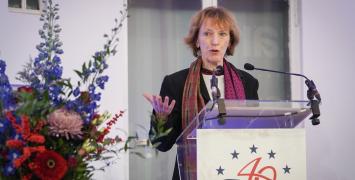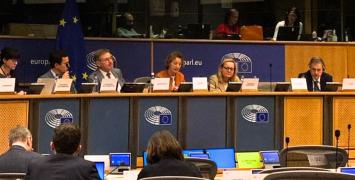Distinguished scientists and scholars to join the ERC Scientific Council
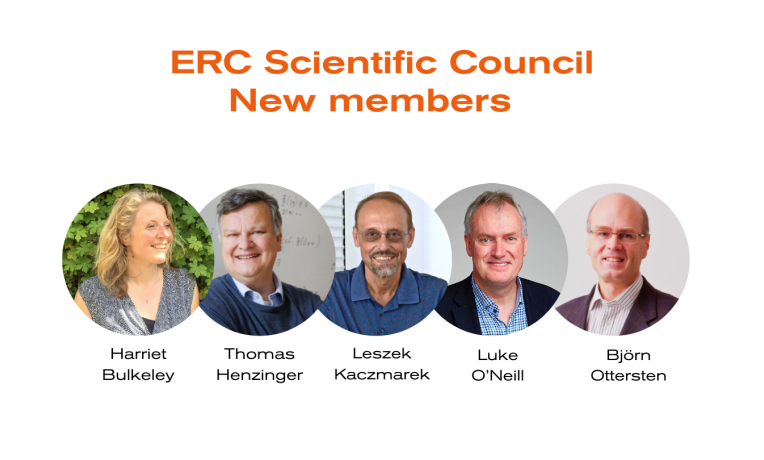
The European Commission has today appointed five eminent scientists and scholars as new members of the governing body of the European Research Council (ERC), the Scientific Council. They are appointed for an initial period of four years and will replace members, whose second term of office expired or will expire. The new members will take office on 1 January 2023.
The new members are
- Professor Harriet Bulkeley, Durham University, Professor of Geography whose research focussed on environmental governance and the politics of climate change, energy and sustainable cities.
- Professor Thomas Henzinger, Institute of Science and Technology, ISTA, Austria, Professor of Computer and Communication Sciences, researcher, and Founding President of ISTA.
- Professor Leszek Kaczmarek, Nencki Institute of Experimental Biology, Polish Academy of Sciences, Warsaw, Professor of Neurobiology who researched the brain-mind connection.
- Professor Luke O’Neill, Trinity College, Dublin, Professor of Biochemistry, founder of the Trinity Biomedical Sciences Institute (TBSI), and leading immunologist.
- Professor Björn Ottersten, University of Luxembourg, Professor and Founding Director of Interdisciplinary Centre for Security, Reliability and Trust. His research is focused on security, trust, reliable wireless communications, and statistical signal processing.
Mariya Gabriel, Commissioner for Innovation, Research, Culture, Education and Youth, said: “The ERC Scientific Council is composed of outstanding European scientists and scholars who oversee Europe’s premier frontier research funding organisation. To name just one recent example of its success - three of this year’s Nobel Prize laureates have received substantial funding for their research from the European Research Council. Today, I am delighted to give a warm welcome to the five new members who bring to the ERC Scientific Council exceptional scientific expertise, which will complement that of the sitting members. I also want to thank the eminent members whose second term of office expired or will expire at the end of this year for their important contribution to the ERC Scientific Council’s work.”
Professor Maria Leptin, President of the ERC, said: “We very much look forward to working with the new members who come from diverse backgrounds in science and scholarship. This breadth is essential as the ERC’s independent governing body represents the entire scientific community in Europe. With these appointments, the quality and continuity of the Scientific Council is upheld, thanks to the work of the identification committee that was tasked with finding these new members.”
By the same Commission Decision, the term of office of five current members of the ERC Scientific Council is renewed:
- Professor Geneviève Almouzni
- Professor Ben Feringa
- Professor Mercedes Garcia-Arenal
- Professor Eystein Jansen
- Professor Jesper Qualmann Svejstrup
The new members have been selected by an independent Identification Committee, composed of six distinguished scientists appointed by the European Commission and chaired by Prof. Carl-Henrik Heldin. The selection process involved consultations with the scientific community.
The ERC Scientific Council, composed of 22 distinguished researchers representing the European scientific community, is the independent governing body of the ERC. Its main role is setting the ERC strategy and selecting the peer review evaluators. It is chaired by ERC President Maria Leptin since November 2021.
Biographies of the new members

Harriet Bulkeley gained her PhD from the University of Cambridge in 1999 where she subsequently held a Junior Research Fellowship and Leverhulme Research Fellowship before joining Durham University in 2003 where she was appointed as full professor in 2010. Since 2018 she has held a joint appointment with Utrecht University.
Her research focuses on the politics and practices of environmental governance, with particular focus on climate change. Her first book (with Michele Betsill) pioneered the field of cities and climate change and her research continues to examine the role of cities and other non-state actors in governing climate change. She has also written extensively on the politics of energy transitions, smart cities, urban sustainability, biodiversity and nature-based solutions, publishing 15 books and edited collections and over 70 papers. She has been included in the Highly Cited Researchers list of the top 1% of researchers internationally four times since 2016.
She has received multiple awards, including the Descartes, Rossi, and Heineman Prizes, and the NASA Exceptional Service Medal. She served as Councilor and Vice President of American Astronomical Society (AAS), president of the AAS/HEAD, APS/DAP, IAU/Division D, member Astrophysics Subcommittee of NASA Advisory Council, Executive Council of the NAS/Space Studies Board, the AAAS, and the Association of Universities for Research in Astronomy (AURA) Board.
Alongside her academic research, Prof. Bulkeley works closely to enable the translation of research for policy and has provided expert advice and undertaken commissioned research for the UK Government, European Commission, NGOs, UN-Habitat, the OECD and the World Bank. In 2014, she was awarded the King Carl XVI Gustaf’s Professorship in Environmental Science and a Visiting Professorship at Lund University, Sweden and in 2018 was granted the Back Award by the Royal Geographical Society in recognition of the policy impact of her work on climate change. In 2019, she was elected as a Fellow of the UK Academy of the Social Sciences and as a Fellow of the British Academy. She has served as a member of ERC Advance Grants Panel SH2 and in 2020/21 was Chair of the SH7 panel.
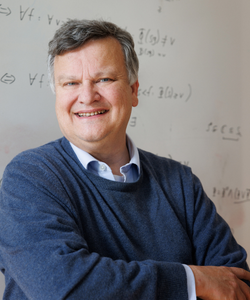
Tom Henzinger is Professor at the Institute of Science and Technology Austria (ISTA), where he was the founding president from 2009 until 2022. He holds a Dipl.-Ing. degree in Computer Science from Johannes Kepler University in Linz, Austria, an M.S. degree in Computer and Information Sciences from the University of Delaware, a Ph.D. degree in Computer Science from Stanford University (1991), and Dr.h.c. degrees from Fourier University in Grenoble, France, and from Masaryk University in Brno, Czech Republic. He was Assistant Professor of Computer Science at Cornell University and Professor of Electrical Engineering and Computer Sciences at the University of California, Berkeley, USA. He was also Director at the Max-Planck Institute for Computer Science in Saarbrucken, Germany, and Professor of Computer and Communication Sciences at EPFL in Lausanne, Switzerland. His research focuses on the theory of software systems, especially models, algorithms, and tools for the design and verification of reliable software systems. His HyTech tool was the first model checker for mixed discrete-continuous systems. He is a member of the US National Academy of Sciences, the American Academy of Arts and Sciences, Academia Europaea, the German Academy of Sciences (Leopoldina), and the Austrian Academy of Sciences. He is a Fellow of the AAAS, the ACM, and the IEEE. He has received the Robin Milner Award of the Royal Society, the EATCS Award of the European Association for Theoretical Computer Science, and the Wittgenstein Award of the Austrian Science Fund.
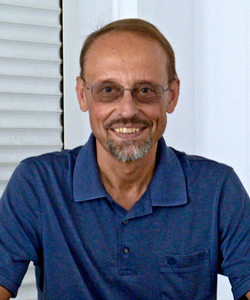
Leszek Kaczmarek is professor of neurobiology at the Nencki Institute, Warsaw, Poland. His carried postdoctoral studies in Philadelphia, USA and then was visiting professor in the University of Catania, Italy, McGill University, Montreal, Canada, University of California, Los Angeles, USA, and Institute of Photonic Sciences, ICFO, Castelldefels, Spain. Since 1986, his laboratory has been investigating brain-mind connection at all the levels of brain organisation from molecular to cellular to network to behavior in health and disease. Most of the work involves experimental animal models, however joint studies with clinicians on human neuropsychiatric disorders have also been pursued. The current major focus is on extracellular enzyme, matrix metalloproteinase, MMP-9, which his laboratory documented to play paramount role in neuronal/synaptic plasticity and then in learning and memory, development of epilepsy, schizophrenia, autism spectrum disorders and alcohol addiction.
Prof. Kaczmarek has also been very active in professional scientific organisations, serving on governing bodies of International Society for Neurochemistry, International Brain Research Organization, European Molecular Biology Organization, European Molecular Biology Conference (currently as the president), National Science Center (Polish research grant agency), Polish Academy of Sciences, Polish-US Fulbright Commission. At the European Research Council, he served seven times in evaluation panels, recently chairing the LS5 Neuroscience and Neural Disorders Consolidator grant panel. He has been engaged in multiple outreaching activities promoting science into society and he co-authored a biology textbook at middle school level.
Prof. Kaczmarek is a member of the Polish Academy of Sciences, European Molecular Biology Organization and Academia Europaea. He has been awarded several prestigious research grants and recognitions including the Foundation for Polish Science (FNP) award for his research on inducible gene expression in the brain. The FNP award is the highest recognition in Polish science. He is currently Full Professor at the Nencki Institute of Experimental Biology, Polish Academy of Sciences, Warsaw, Poland.
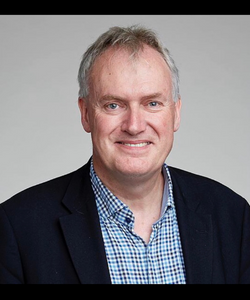
Luke O’Neill is Professor of Biochemistry in the School of Biochemistry and Immunology, Trinity Biomedical Sciences Institute at Trinity College Dublin, Ireland. He is a world expert on innate immunity and inflammation. He is listed by Thompson Reuters/ Clarivates in the top 1% of immunologists in the world, based on citations per paper. Profe. O'Neill is co-founder of Sitryx, which aims to develop new medicines for inflammatory diseases. Another company he co-founded, Inflazome was recently acquired by Roche.
He has won many awards for his research including the Royal Dublin Society / Irish Times Boyle Medal for scientific excellence, the Royal Irish Academy Gold Medal for Life Sciences, the European Federation of Immunology Societies Medal, and the Landsteiner Award from the Austrian Academy of Sciences. He is a member of the Royal Irish Academy, EMBO (European Molecular Biology Organisation) and a Fellow of the Royal Society.
He also has a passion for communicating science to the public. He has a weekly radio slot on Irish radio and has published several popular science books, most recently ‘Never Mind the B#ll*cks Here’s the Science’, which won the 2020 Irish non-fiction book of the year, and ‘Keep Calm and Trust the Science – an extraordinary year in the life of an immunologist’, which was his diary during the COVID19 pandemic.

Björn Ottersten is Professor at University of Luxembourg.
He is founding Director of the Interdisciplinary Centre for Security, Reliability and Trust at the University of Luxembourg. He received his Ph.D. in Electrical Engineering from Stanford University, USA. Prof. Ottersten has held research positions at Linköping University, Sweden, Stanford University, USA, and the Katholieke Universiteit Leuven, Belgium. During 1996/97 he was Director of Research at ArrayComm Inc, San Jose, USA, a start-up company based on Ottersten's patented technology introducing antenna arrays in wireless communication systems to improve coverage, capacity, and reliability of mobile communication systems. In 1991, he was appointed Professor at the Royal Institute of Technology, Stockholm, Sweden, where he was head of the department for Signals, Sensors, and Systems and later dean of the School of Electrical Engineering.
Prof. Ottersten has been Digital Champion of Luxembourg, acting as an adviser to the European Commission, member of the governing board of the Swedish Research Council, and is currently serving on the governing board of the Swedish Foundation for Strategic Research. He serves, and has served, as member of several international scientific advisory boards as well as editorial boards of scientific journals. He was a member of the board of governors of IEEE Signal Processing Society and acts on the board of directors of the European Association for Signal Processing (EURASIP), the two main international scientific organizations in his field.
Prof. Ottersten is the recipient of two ERC Advanced Grants and two ERC Proof-of-Concept Grants. He is a Fellow of the IEEE and EURASIP. His research has been recognised by numerous awards including the IEEE Signal Processing Society Technical Achievement Award.
About the ERC
The ERC, set up by the European Union in 2007, is the premier European funding organisation for excellent frontier research. It funds creative researchers of any nationality and age, to run projects based across Europe. The ERC offers four main grant schemes: Starting Grants, Consolidator Grants, Advanced Grants and Synergy Grants.
The ERC is led by an independent governing body, the Scientific Council. Since 1 November 2021, Maria Leptin is the President of the ERC. The overall ERC budget from 2021 to 2027 is more than €16 billion, as part of the Horizon Europe programme, under the responsibility of the European Commissioner for Innovation, Research, Culture, Education and Youth, Mariya Gabriel.


